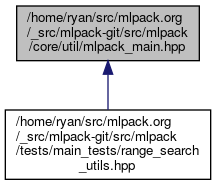

Go to the source code of this file.
Macros | |
| #define | BINDING_TYPE BINDING_TYPE_UNKNOWN |
| #define | BINDING_TYPE_CLI 0 |
| #define | BINDING_TYPE_GO 4 |
| #define | BINDING_TYPE_JL 3 |
| #define | BINDING_TYPE_MARKDOWN 128 |
| #define | BINDING_TYPE_PYX 2 |
| #define | BINDING_TYPE_R 5 |
| #define | BINDING_TYPE_TEST 1 |
| #define | BINDING_TYPE_UNKNOWN -1 |
Macro Definition Documentation
◆ BINDING_TYPE
| #define BINDING_TYPE BINDING_TYPE_UNKNOWN |
Definition at line 31 of file mlpack_main.hpp.
◆ BINDING_TYPE_CLI
| #define BINDING_TYPE_CLI 0 |
- Parameters
-
mlpack_main.hpp
This file, based on the value of the macro BINDING_TYPE, will define the macros necessary to compile an mlpack binding for the target language.
This file should only be included by a program that is meant to be a command-line program or a binding to another language. This file also includes param_checks.hpp, which contains functions that are used to check parameter values at runtime.
mlpack is free software; you may redistribute it and/or modify it under the terms of the 3-clause BSD license. You should have received a copy of the 3-clause BSD license along with mlpack. If not, see http://www.opensource.org/licenses/BSD-3-Clause for more information.
Definition at line 21 of file mlpack_main.hpp.
Referenced by set().
◆ BINDING_TYPE_GO
| #define BINDING_TYPE_GO 4 |
Definition at line 25 of file mlpack_main.hpp.
◆ BINDING_TYPE_JL
| #define BINDING_TYPE_JL 3 |
Definition at line 24 of file mlpack_main.hpp.
◆ BINDING_TYPE_MARKDOWN
| #define BINDING_TYPE_MARKDOWN 128 |
Definition at line 27 of file mlpack_main.hpp.
Referenced by macro().
◆ BINDING_TYPE_PYX
| #define BINDING_TYPE_PYX 2 |
Definition at line 23 of file mlpack_main.hpp.
Referenced by endif().
◆ BINDING_TYPE_R
| #define BINDING_TYPE_R 5 |
Definition at line 26 of file mlpack_main.hpp.
◆ BINDING_TYPE_TEST
| #define BINDING_TYPE_TEST 1 |
Definition at line 22 of file mlpack_main.hpp.
◆ BINDING_TYPE_UNKNOWN
| #define BINDING_TYPE_UNKNOWN -1 |
Definition at line 28 of file mlpack_main.hpp.


